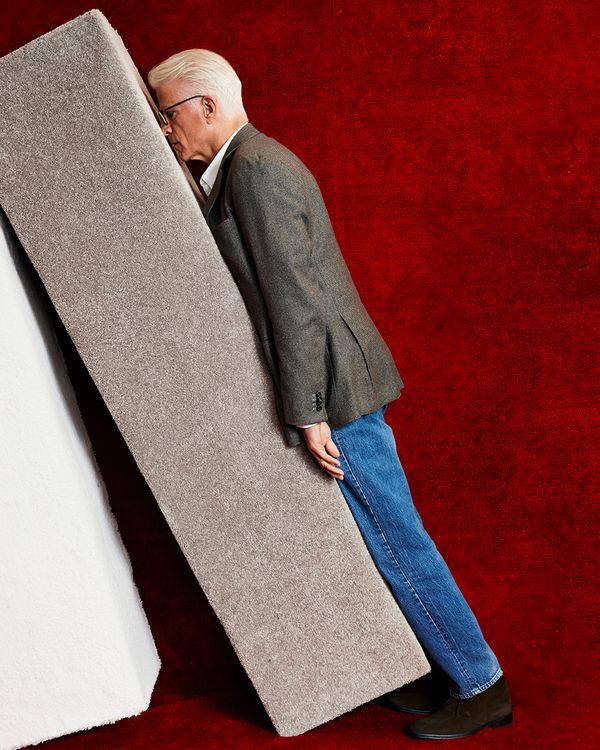
In the season-one finale of The Good Place is a moment so bracing and clever, it immediately became iconic.
Mike Schur’s inventive, tenderly heartfelt NBC sitcom centers on the exceedingly self-involved Eleanor (Kristen Bell), who wakes up in the afterlife to find herself in a Heaven-like utopian neighborhood, only to panic when she realizes she’s been sent there by mistake. She decides to change her ways in order to earn her spot in the Good Place and bypass the chance of damnation. As any semblance of peace in the brightly colored utopia continues to unravel in the season-one finale, Eleanor turns to her compatriots — Chidi (William Jackson Harper), an anxious ethics professor; Tahani (Jameela Jamil), a gorgeous and privileged philanthropist with an obsessive need to be the best; Jason (Manny Jacinto), a kindhearted idiot from Florida who pretended to be a silent monk; and Janet (D’Arcy Carden), a Siri-like being meant to aid people in the afterlife — her face dawning with the glow of an epiphany. “This is the Bad Place,” Eleanor intones with confidence.
The camera pans to Michael (Ted Danson), the architect of the “Good Place.” His face is perched between curiosity and puzzlement; then, in an instant his eyes grow cold and a devious smile appears. A childlike giggle curdles into a malevolent cackle that essentially splits the series in two, launching it into a bold new direction. This moment is a supreme marriage of craft and theme — an actor’s prowess, assured directing, and great writing — and it encapsulates the greatness of the series in roughly less than 30 seconds. But to understand what has made Danson’s performance such a revelatory standout in his storied career comes seconds after this laugh. He huffs and spazzes in frustration at Eleanor’s ingenuity, plopping down into a sloping white chair his tall frame seems ill-suited for. He turns calm and faces Eleanor, staring at her with catlike insolence as he gently knocks a potted plant to the floor, as if to say, “What the hell are you going to do about it?”
Danson’s role in The Good Place is just one small part of a tremendous career. Since he began acting in the mid-1970s, he’s appeared in films like the hothouse noir Body Heat, the comedy Three Men and a Baby, and the World War II epic Saving Private Ryan. But where Danson truly shines is on television. He has that particular blend of warmth, familiarity, and just the right amount of invention that’s required of an actor — the kind who becomes a titan of the half-hour sitcom, which Danson did with the NBC series Cheers. Running for 11 highly successful seasons, Danson played the charming, troubled bartender-manager Sam Malone. As Ian Crouch wrote for The New Yorker, “If Cheers was arguably the perfect sitcom, then Sam was the perfect leading man. […]He looked less like a former ballplayer than he did a dancer, prowling behind the bar, a towel thrown jauntily over his shoulder in between polishing glasses. In a way, he was a familiar TV lothario, an inveterate ladies’ man—tall, stylish, with a coiffed mane, tight pants, a few buttons on his shirt undone, his eyes always searching for a mirror.”
In the decades since Cheers went off the air in 1993, Danson has, to varying degrees, subverted, skewered, leaned into, and ultimately outgrown the rakish machismo of Sam Malone that, in the years following Cheers, threatened to cast a long shadow over his career. Danson could have deployed endless riffs on Sam or gotten stuck within financially expedient, but artistically unsatisfying procedurals, like the CSI: Crime Scene Investigation franchise, which he was a part of for a few years until 2016. He isn’t without his failures, including the quickly canceled ABC series Help Me Help You. But primarily, he’s gone on to find success in roles like the misanthropic titular doctor of Becker; the narcissistic billionaire with a heart of darkness on the thriller Damages (which marked a fascinating turn toward darker roles); an emotionally excessive New York editor on Bored to Death; a sunny riff on himself — complicated by self-involved, rancorous qualities only Larry David recognizes — on Curb Your Enthusiasm; and the morally upright sheriff in a world of darkly comedic crime on the second season of Fargo.
Michael, the demon who’s gone from an architect of torture to a genuine ally to the four humans in The Good Place, marks a particularly noteworthy entry in Danson’s post-Cheers career. His performances — even his most loathsome characters — feel all too human, showcasing what Crouch refers to in his New Yorker profile as the “effortless-looking panache” that has come to define the actor. Michael allows for a far different approach. Danson lends the character a surreal, even “alien quality” that feels distinct from his previous high-profile roles, and embodies the moral complexity of the character’s arc toward discovering his own humanity.
Season one of The Good Place gave Danson the opportunity to play with a number of fascinating traits: zany physical humor, calculated warmth, and a genuine curiosity in the oddest corners of the human experience (just look at how he marvels at paper clips). The revelation in the season-one finale allows Danson to drop his pretenses and better interrogate the strange contradictions of an inhuman character grappling with his growing humanity, which becomes fully apparent as season two broadens his arc. Michael was still somewhat of a puzzle going into season two. In the third episode though, things take a turn when he suggests to Eleanor and the other humans that they join forces for everyone’s mutual benefit. The humans agree, on the condition that Michael has to participate in the ethics classes Chidi teaches the other humans, in the hopes they’ll qualify for the real Good Place. It’s after this episode that Michael’s arc comes into focus: He becomes a demon who highlights the anxieties and wonder of what it means to be human.
Touches of humanity are casually injected in Danson’s performance. He’ll go off on platitudes about the weirdness of human ethics or mockingly call attention to the human body. His insults, particularly aimed at Chidi — “Professor Buzzkill got in my head!” — feel like the vocal equivalent of an eye-roll crossed with a slap in the face. As Danson told Vulture, when asked if he breaks into laughter often during the filming of the series, “The written word on this show is elevated. It’s not conversational, it’s very bright and very elevated and it’s not colloquial. So you have to work your ass off to get the lines down. My focus is so much on getting the words right.” He pulls off the heady dialogue with panache, but his performance is notable for more than that. He pivots swiftly between emotions — exasperation, shock, anger, giddy malevolence — with the wonderment of a child experiencing everything for the first time. Danson also plays up that alien quality in his physicality, reminding us that he is a demon in a human suit.
Just watch the weirdly elastic way his face shifts from a glare to overwhelming relief at the end of “Leap Into Faith,” when the train pulls away, revealing the rest of his ragtag family is safe, or all the moments he seems especially uncomfortable in his body, as if newly realizing it is ill-fitting. This quality is never better displayed than in the fourth episode this season, “Existential Crisis,” when Chidi figures out that the reason Michael struggles with ethics is because he lacks a crucial aspect of the human experience: our sense of mortality. To help him understand, Chidi points to the closest thing demons have to mortality, “retirement,” a rare consequence in which demons essentially die in a rather excruciating manner, which could happen if Michael’s boss finds out that he’s aiding the humans he’s meant to torture. “You’re saying … I would be … no me?” he asks before wailing in anguish. Michael’s existential crisis ends up taking the form of a clichéd masculine midlife crisis: a red sports car, pierced ear, a suit that seems ripped from Miami Vice, and making Janet fashion herself as a minx-y secretary who hangs on his every word. There’s a sloppy, lackadaisical silliness to how Danson moves, as if Michael got drunk on his anguish.
As season two has progressed, Danson’s touches of humanity, once casually introduced, have become more deliberately, boldly laced into his performance. Take his conversation with Eleanor at the end of the episode “Derek,” when she draws attention to how his desire to simply chat with her is a pretty “human-y” thing to do. His eyes dart around as if realizing for the first time just how human he’s becoming. Season two has granted Danson many moments to play up this aspect of his arc, whether it be in proclaiming Janet a friend or in the way his voice cracks as he apologizes to Chidi at the end of “The Trolley Problem.” Over the course of the 802 reboots he’s put the humans through, his curiosity with them has grown into connection and empathy. He may have started this season deciding to team up for selfish reasons, but he’s evolved to genuinely care about these people.
Tonight’s episode of The Good Place is a particularly startling entry in the series, pushing Danson’s character in a new direction. In the episode [spoilers ahead], the team moves forward with their plan to infiltrate the Bad Place, in order to plead their case to “the Judge.” Things only grow more complicated and zany when they get there and encounter demons who carry themselves like bros ripped from the worst bar on South Beach. But the episode ends on a surprising and moving note for Michael, who proves himself to be even more human than I think he even expected – he sacrifices his own life so the humans can make it to the Judge. He shares a tender moment alone with Eleanor, giving her a pin necessary to travel through the portal. “Hey guess what? I just solved the trolley problem,” Michael says. “Remember the thought experiment where you’re driving the trolley and you can either plow into a group of people or turn and hit one person? I solved it. See, the trolley problem forces you to choose between two versions of letting other people die, but the actual solution is very simple. Sacrifice yourself.” It’s an impactful goodbye (though I doubt this is the last we’ve seen of him). The final image Eleanor sees as she is flung through the strange portal is Michael’s face, marked by a careful blend of sorrow, understanding, and kindness. It’s one of the most tender, moving, and emotionally complex moments I’ve witnessed on television in a long time, and it wouldn’t work without Danson.
It’s easy to take a television star like Danson for granted due to how effortless he makes his work look. But a star of his magnitude — remember, he led Cheers for 11 years with its finale racking up a record 93 million viewers, and he’s been a lasting presence on television ever since then — does not find longevity by happenstance. It takes a curious alchemy to be a TV star, especially one so associated with half-hour sitcoms, which require a blend of familiarity that should never become stale, lest they risk dimming in the mind of the audiences who allow them in their home week after week. And on The Good Place, Danson feels especially wondrous. He’s zany yet heartfelt, cunning yet arch, while never forgetting the existential quandaries rooted in the arc of his character.
Actors have long subverted their previously relatable images by playing characters that hew toward darkness, and Danson has done this in the years since he played Sam Malone, to varying degrees. But in The Good Place, he pushes his artistry to new heights by taking a different approach. Here’s a demon rooted in darkness, who decides to bend toward the light. It’s a character gaining a soul rather than sacrificing one on the altar of ambition. Season two does more than allow Danson to experiment with heightening the alien qualities of his character. It allows him to consider what it means to be human in the first place.





